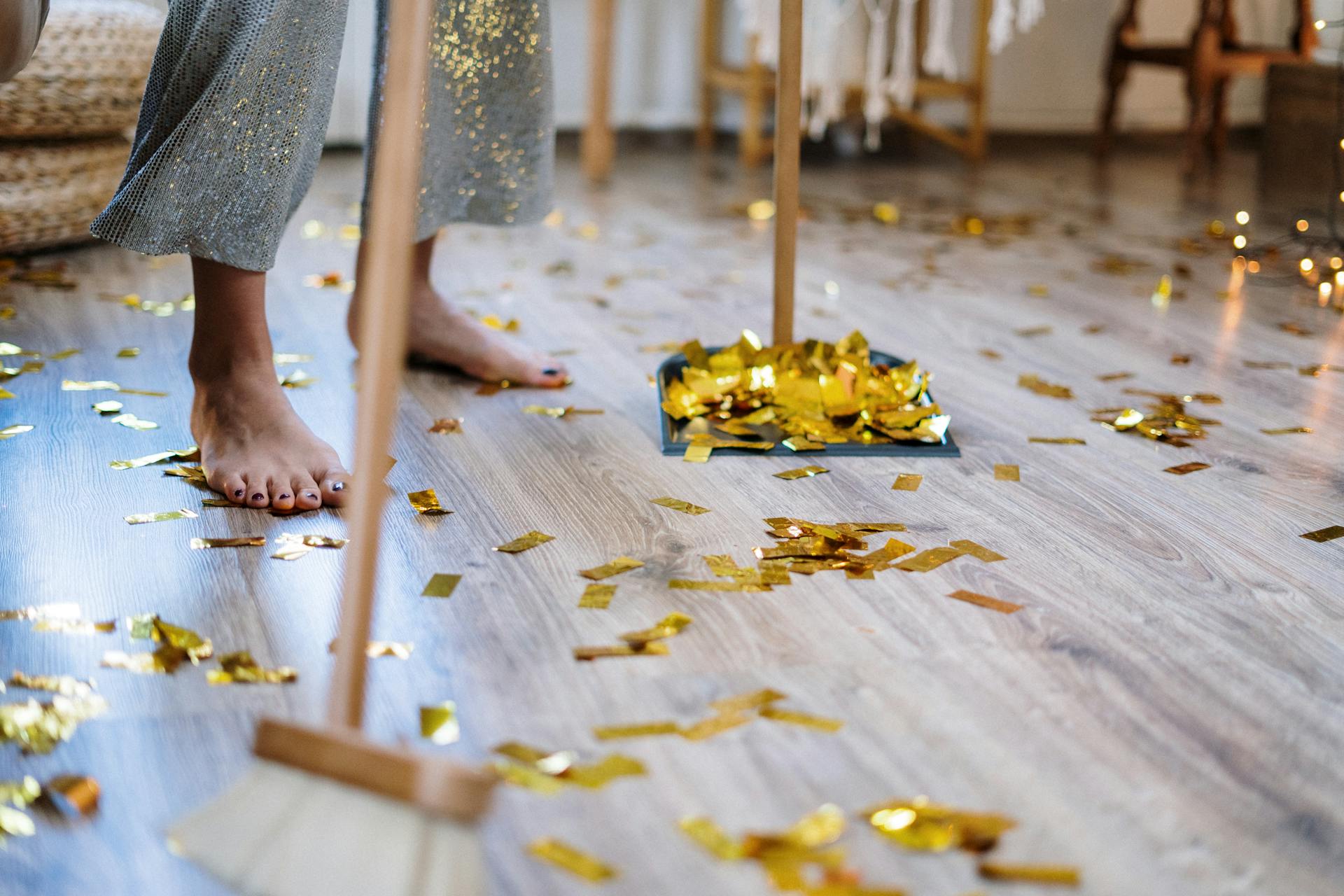
Sweating after a warm shower is an irritating and uncomfortable occurrence. In the summertime, it can be even worse as the humidity levels outside will likely match or exceed that of a hot shower. Luckily, there are some steps you can take to prevent excessive sweating after a shower or bath.
First of all, consider adjusting your showering habits by reducing the water temperature and length of time. Since warm water will increase perspiration, use lukewarm or cold water for your showers instead. Additionally, try to limit your duration in the shower so that it never exceeds more than 10 minutes.
In addition to adjusting your water temperature and duration, make sure you are using an effective soap or body wash that eliminates sweat-inducing bacteria from your body. It's important to note that there are certain antibacterial ingredients like aluminum chlorohydrate, aluminum sesquichlorohydrate, and potassium alum which have been proven to reduce perspiration in some individuals. Try incorporating one of these antibacterial agents into your soapy routine before stepping outside the shower every day.
Finally, be aware of the fabrics you wear when heading out after a shower. Cotton is known for its ability to absorb moisture which is great for absorbing sweat after you've toweled off - however if cellulose fibres like rayon or polyester fibre which won't help absorb moisture in this situation - it'll only snug up against your skin accentuating any wetness post-shower. So opt for cotton clothing or clothing material that has sweat wicking technology built-in − these fabrics help transfer moisture away from the skin efficiently without sticking to it!
Overall, excessive sweating after a shower is not just uncomfortable but can also lead to further issues with bacterial infections if not treated properly − luckily there are ways like altering temperature and length of showers, using antibacterial agents and wearing proper clothing material that can help prevent perspiration post-shower!
Here's an interesting read: Prevent Leg Cramps
How to reduce body temperature after showering?
One of the most enjoyable things about showering is how it can reduce your body temperature after a hot day. However, if you’re not careful, you can end up feeling hotter than before you started. To prevent this and keep things running as cool as possible, there are a few things you can do to reduce your temperature after a shower or bath.
First, keep the water to a comfortable temperature. Hot baths and showers feel nice but they also come with their own set of risks, such as overheating and dehydration. Though it might be tempting to go for the hottest option available, it’s best to resist and keep the water closer to lukewarm for a safer showering experience.
Next, try to focus your time in the shower on areas where you tend to sweat most. This will help keep everything from becoming too heated or uncomfortable during your break from the heat outside. Also keeping is mind that shorter showers mean less of a risk of over-heatingyour body.
Using an invigorating environment can also work wonders in cooling down your body post-showering without having to immediately turn off the water and run out into colder temperatures which can cause issues in itself due to overstimulation on the skin. Anything from minty shampoos or soaps with essential oils like peppermint and eucalyptus are great options! Keeping air circulated inside will also help regulate temperature and take away some extra heat from both the steam of your bath/shower and any heat coming inside from outside sources like sunshine!
You might enjoy: How to Keep Sweat Out of Eyes?
What can be done to cool off quickly after a shower?
A hot, post-shower experience can be incredibly uncomfortable and even unbearable at times on hot days. But thankfully, there are a few solutions for cooling off quickly and easily in the wake of a shower.
The simplest and most cost-effective tip for cooling down post-shower is to utilize fans and open windows. For example, by standing in front of a fan or opening screen windows after your shower, you can create a pleasant breeze that helps conduct heat away from the body and make an otherwise sweltering bathroom feel much more comfortable. If you don't have access to fans or windows, hand towels are a great makeshift option; simply toss a wet towel over your shoulders and marvel as it melts away the heat of the shower steam in a matter of moments.
You can also take some steps to cool yourself down before hopping into the shower itself - like pre-cooling your room by simply opening up your windows beforehand. Taking fewer showers helps too; try dirtying your towel every two or three days instead of every day. Additionally, think twice before taking baths as they're typically longer than showers and leave you with more heat to wade through afterwards.
If you're still struggling to cool off post-shower, consider using peppermint extract or essential oils on the back of the neck — both methods provide an invigorating chill that awakens the senses from its refreshing effects. Another option is icy compresses placed around specific parts of the body where you feel heat most intensely after stepping out of the shower. These solutions work great for people prone to extreme discomfort after their baths — giving them the chance to feel better instantly.
Are there any tips to avoid excessive sweating post-shower?
Sweating post-shower can be a major annoyance that many of us can relate to on a regular basis. Fortunately, there are some strategies you can follow to help minimize the impact of sweatiness and feel more comfortable afterwards.
The key is to take certain steps before, during, and after your shower. First, begin by using warm rather than hot water to minimize the body's tendency to respond by sweating. Generally, lukewarm water tends to work best for many people. During your shower, try gently massaging any potentially sweat-prone areas of your skin with an exfoliating scrub or loofah mitt. This allows for better air circulation through the skin pores which in turn can diminish moisture buildup and reduce sweating.
Lastly, it’s important not to overdo it with products such as soap or body wash – using only the minimum necessary amount allows you to avoid excess sweating after showering or bathing. As an added bonus, limiting yourself when it comes to personal hygiene products also helps keep natural bacteria on your skin intact which in turn makes it easier for you to cool down quickly post-shower rather than staying sweaty and uncomfortable.
It’s worth bearing in mind that you should always leave enough time between showering or bathing and venturing outside so that the body temperature can return back to normal levels again, thus avoiding excessive sweating afterwards. Follow these simple tips regarding preparation before and while taking a shower as well as allowing sufficient time afterwards and you should be able manage excessive sweat irritatingly post-shower!
Intriguing read: Stop Sweating
How to maintain a cool temperature after a shower?
After a shower, it can be difficult to maintain a cool temperature. Itcky sweat, uncomfortably warm rooms and the danger of catching a chill all make for an especially uncomfortable experience. However, it is possible to stay cool and comfortable without spending too much time on cooling off.
The simplest thing you can do is to take shorter showers using lukewarm water. If you have tricky-to-cool rooms, such as attics or conservatories, it pays to invest in some good quality window treatments. Darker curtains that block out the sun in summer months will reflect heat away and keep your space much less stuffy during warm weather. On humid days, invest in an air conditioning unit or dehumidifier - also great if you suffer from allergies as they keep the moisture out of the room - alternatively if you need to cool quickly switch on an electric fan.
Finally, make sure your bedding is breathable and lightweight, cotton sheets and light duvets won’t trap body heat while you sleep - making those long summer nights much easier! With these tips in mind, there’s no need to suffer through the heat - stay cool even after a hot shower!
Is there any way to reduce perspiration after taking a shower?
Today, dealing with perspiration can be a major issue, especially during the warmer months. Many people find themselves drenched in sweat as soon as they finish taking a shower. This can be incredibly uncomfortable and irritating but fortunately, there are some simple steps you can take to reduce perspiration after taking a shower.
The first step to reducing perspiration is to make sure you’re using lukewarm water when showering. Hot water can cause pain receptors beneath the skin that can potentially trigger the sweat glands. Lukewarm water is much better for you and will not activate these receptors, thus minimizing perspiration after you’re done showering.
The second step is to moisturize your body while in the shower and afterwards with an unscented lotion or cream. Not only will this keep your skin soft and smooth, but it will also provide an instant coating on the skin which reduces overall sweating by trapping moisture on your body and preventing it from evaporating. Additionally, moisturizing helps balance out the pH levels of your skin which can be key for healthy sweat control overall.
Finally, try drying off completely before getting dressed—once you get dressed immediately after a shower, the trapped residual moisture close to your body can lead to increased sweating, especially if in warm temperatures or tight clothing items such as jeans or synthetic materials like nylon or spandex. To keep away any further irritation due to sweatiness it may even be beneficial to add a talcum powder to areas such as your feet and armpits for extra dryness before becoming actively engaged in activities post-showering!
What are some ways to manage body heat after a warm shower?
Taking a warm shower after a long day is one of life’s simple pleasures. After stepping out of the shower, we often find ourselves enveloped in a cloud of unbearable heat. It may be tempting to jump right back in the shower to cool off, but there are numerous other ways to manage body heat post-shower.
One way to manage body heat after a warm shower is by applying cool compresses or wet washcloths to parts of the body to lower perspiration and reduce body heat. For example, if your facial area is feeling especially hot, apply a cold compress or wet washcloth lightly around your face for 10-20 minutes. This will bring down your body temperature and reduce any redness on your skin.
Another way to reduce body heat post-shower is by turning the fan up and allowing air flow through the room. This can help circulate air, cooling off you and your bathroom with ease. You can also open windows or position yourself directly in front of an open window and let in some fresh bulk from outside, allowing the temperature in and around you body to decrease naturally without having use excess energy or causing strain on our environment.
Finally, if your house doesn’t have air conditioning – fill up several large water bottles with cold water (or place them in an ice bath beforehand) then wrap them up with a thin cloth before lying down on top of them while watching TV or doing something else that allows you relax while minimizing further sweating produced by physical activity. This can be particularly helpful prior bedtime when you’re already trying to keep cool enough that allows you enter into a deep sleep
Featured Images: pexels.com


